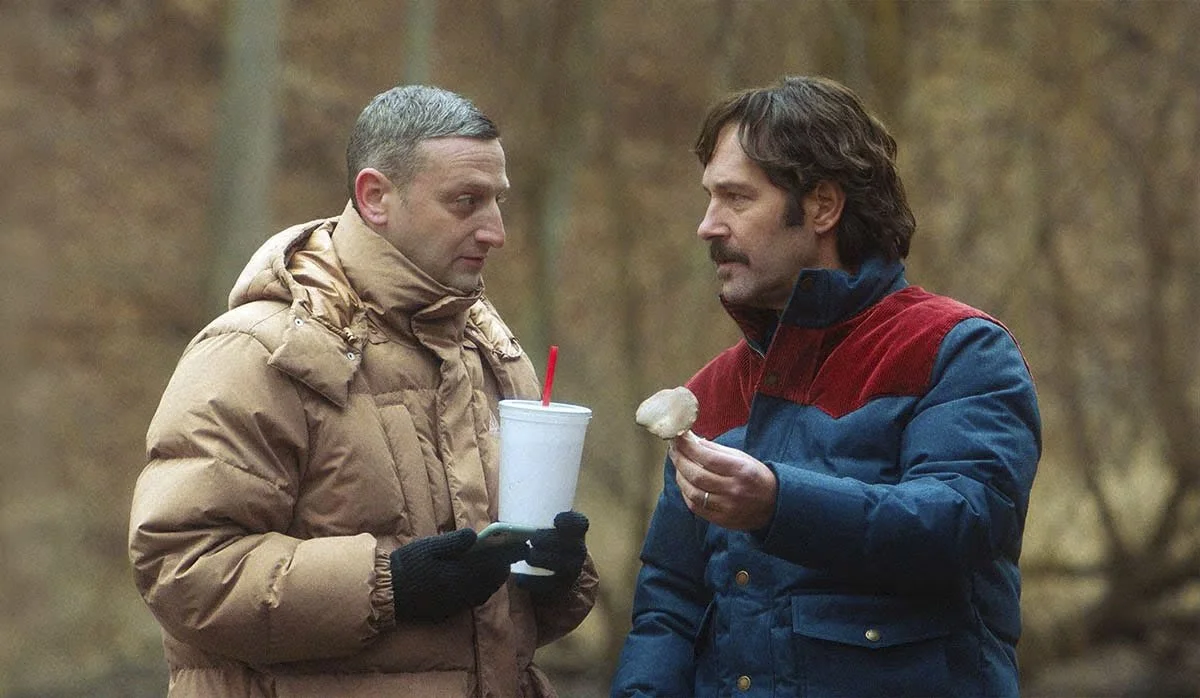REVIEW: ‘Friendship’ connects sketch comedy absurdity with feature film scale
Tim Robinson and Paul Rudd star in Friendship, written and directed by Andrew DeYoung.
A question came up after finishing my screening of Friendship, the new Tim Robinson comedy: if you’re unfamiliar with Robinson’s work, is Friendship a good entry point? Or would it be better to start with one of his TV series, like his Netflix sketch show I Think You Should Leave or the Comedy Central sitcom Detroiters?
Robinson is known for his unique, absurdist, and often rage-filled performances, and I’m not sure how a newcomer would react if a feature-length format like Friendship was his first exposure to it. From the outside, the gravel-voiced, socially inept suburbanite at the centre of the movie must seem deeply weird and almost frightening. There’s a reason this movie debuted last fall at the Toronto International Film Festival’s Midnight Madness programme.
But for Robinson’s fans, the movie will feel instantly recognizable. Robinson’s character, Craig Waterman, could easily have been expanded from any of the sketches on I Think You Should Leave, a show that always presents a character whose antisocial behaviour prompts the expression in the title. Craig is a passionless lump of a man, frequently seen shuffling around in an oversized beige parka, who desperately needs an outlet for his feelings of inadequacy. Craig’s wife, Tami (Kate Mara) is teetering on the edge from pitying him to loathing him. Craig works for a depressingly plausible company that specializes in making apps more addictive. His greatest accomplishment is wrestling with the city bureaucracy to install a speed bump on his street.
Craig (Robinson) is married to Tami (Kate Mara), who barely tolerates him.
A package delivery mixup allows Craig to meet his neighbour Austin (Paul Rudd), a local Renaissance man and TV weather presenter, who seems like everything Craig wants to be: charming, talented, free-spirited. This platonic meet-cute leads to Austin welcoming Craig into his life, offering him tickets to a show for Austin’s punk band and leading him on late-night adventures in urban exploration. Craig feels like his mind has expanded and begins to re-orient his whole life around his relationship with Austin.
But like so many I Think You Should Leave characters, Craig is like an eager-to-please robot with a corrupted software update. Basic structures of human connection elude him, and while he can perceive when he’s done something wrong, his reaction is often to dig in his heels, obfuscate or distract, rather than apologize. There’s a specific quality that Robinson’s voice takes on when this happens; a raspy, guttural sound entirely his own that I find intensely funny. A great example is when his frequent collaborator Connor O’Malley turns up during a party scene. Despite how often they’ve worked together and how many arguments their various characters have had, you can still see O’Malley struggling not to crack up when facing down Robinson’s onscreen temper.
Friendship’s story is a topical one; the question of whether it’s possible for adult men to form lasting bonds with each other has been discussed by experts and pundits and has formed the spine of some of Robinson’s previous sketches. Politics barely registers at all in the world of the film, but it’s hard not to wonder if the sort of disconnected and stubborn person exemplified by Craig is symbolic of the voters who allegedly swung the results of the 2024 American election. Craig seemingly craves permission to do any of the things he wants in life, and will worship whoever grants it to him. And if that permission is then taken away, Craig crumples into childlike fury.
Robinson easily adopts a familiar office drone persona.
For all the interesting ways in which Friendship captures your attention by expanding on the unsettling weirdness of an ITYSL sketch, there is a double edge to scaling up that format. The Netflix show can abruptly cut a scene for comedic effect and only pursue a concept for as long as it needs to before shuffling the players; many episodes are only 15 minutes long. Friendship, meanwhile, can occasionally feel aimless in its storytelling. Craig is so unmotivated (by design) that you begin to wonder how the filmmakers are going to stick the landing. This might, however, be a symptom of first-time viewing. Upon knowing the ending, repeat viewings could very well allow you to fully enjoy and even memorize key parts.
At one point, Craig yells at Austin, claiming, “You all accepted me way too fast. You made me feel too free!” He doesn’t intuit the basic social guardrails that everyone else takes for granted. Funnily enough, the movie imitates that, adopting a loose structure that might not work for everyone. But Robinson, the cast, and writer-director Andrew DeYoung have succeeded in crafting something more nuanced and poignant than a simple sketch. Does it provide more unexpected pathos than Karl Havoc’s plight? I’ll let you be the judge.
Friendship gets three and a half stars out of four.
Stray thoughts
The synth-y score was an interesting touch and does a great job of pushing the movie away from being a flat-out comedy.
It sort of speaks volumes that even when tripping on toad venom, Craig’s mind can’t transcend beyond changing his regular order at Subway.
The intensity of the cringe comedy was surprisingly bearable - the ghost tour sketch from ITYSL is still unmatched on a secondhand embarrassment level.




